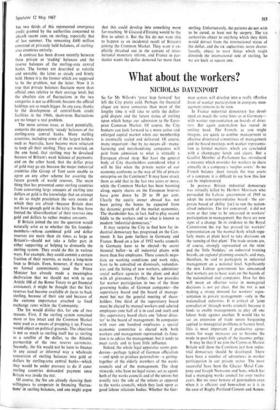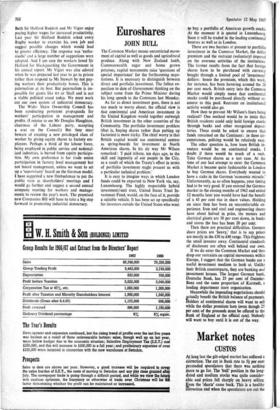What about the workers?
NICHOLAS DAVENPORT
So far Mr Wilson's 'great leap forward' has left the City pretty cold. Perhaps the financial clique are more conscious than most of the lengthy time it will take to settle the dollar- gold dispute and the future status of sterling upon which hangs our admission to the Euro- pean Common Market. Of course, the City bankers can look forward to a more active and enlarged capital market when our membership is eventually sealed and delivered. Of course, many important—but by no means all—manu- facturing and merchandising companies will gain from admission to what is virtually a European closed shop. But have the general body of City shareholders considered what it will be like when the private sector of our economy conforms to the way of life of private enterprise on the Continent? It may have struck ' them as odd that in the last two years or more, while the Common Market has been booming along, equity shares on the European bourses have gone down by 20 to 30 per cent. Clearly the equity owner abroad has not been getting the bonus he expected from the dynamic growth of the market economies. The shareholder has, in fact, had to play second fiddle to the workers and to what is known as modern 'industrial democracy.'
It may surprise the City to find how far in- dustrial democracy has progressed on the Con-. tinent. It has gone furthest in Germany and France. Based on a law of 1952, works councils in Germany have to be elected—by secret' biennial ballot—in all industrial plants with more than five employees. These councils nego- tiate on working conditions and work rules, have to be consulted on ditmissals, redundan- cies and the hiring of new workers, administer social welfare -agencies in the plant and deal with all grievances. Further, the law provides for worker participation in two of the three governing bodies of German companies—the supervisory board and the board of manage- ment but 'not the general meeting of share- holders. One third of the supervisory board must be elected by manual workers and salaried employees (one half of it in coal and steel) and this supervisory board elects one 'labour direc- tor' to the board of management. In companies with over one hundred employees a special economic committee is elected with both workers and management represented; its func- tion is to advise the management; but it tends to meet rarely and to have little,influence.
Indeed, the whole ,legal apparatus seems pon- derous—perhaps typical of German officialism —and tends to produce paternalism—a getting- together of the elderly members of the works councils and of the management. The shop stewards, who have no legal status, act as agents both of the works councils and of the unions but usually take the side of the unions as opposed to the works councils, which they look upon as good labour relations bodies. Whether the Ger- man system will develop into a really effective form of worker participation in company man- agement remains to be seen.
In France industrial democracy has devel- oped on much the same lines as in Germany—
with worker representation on boards of direc- tors. But again paternalism has reared its smiling head. The French, as you might imagine, are quick to confine management to effective directorial committees of management and the board meetings with worker representa- tion to formal matters, which are concluded with a champagne lunch and cigars. But a Gaullist Member of Parliament has introduced
a measure which provides for workers to share annually in a company's 'surplus assets.' As no French balance sheet reveals the true assets of a company it is difficult to see how this law can be implemented.
In postwar Britain industrial democracy • was virtually killed by Herbert Morrison who persuaded the Labour government of 1945 to adopt the non-representative board —'the cor-
porate board of ability' bid to run the nation- alised industries. The TUC concurred: it did not
seem at that time to be interested in workers' participation in management. But there are now signs of a change. In its evidence to the Royal
Commission the -Fur has pressed for workers' representation on 'the normal body which regu- larly meets at plant level to take decisions on
the running of that plant.' The trade unions are,
of course, strongly represented on the NEDC and the 'little Neddies,' on industrial training
boards, on regional planning councils, and may, therefore, be said to participate in industrial management on a national level. Significantly • the new Labour government has announced that workers are to have seats on the boards,of the nationalised steel companies. How far this will mean an effective voice in managerial decisions is not yet clear. But the ruc is not • making a- strong demand for workers' repre- sentation in private management—only in the nationalised industries. It is critical of 'joint consultati3n' through works councils because it tends to enable managements to play off one labour body against another. It would like to see an extension of trade union bargaining applied to managerial problems at 'factory level. This is most important if productivy agree- ments for wage increases are to become the mode in post-July epoch of the incomes policy.
It may be that if we join the Common Market Britain will show the Continent just how indus- trial democracy should be developed. There have been a number of adventures in worker participation in our private sector. The most successful have been the Glacier Metal Com- pany and Joseph Newsome and Sons, which has had a managing works council for over twelve years. But we must beware of paternalism even when it is efficient and benevolent as it is in the case of Rugby Portland Cement and Acrow. Both Sir Halford Reddish and Mr Vigier enjoy paying higher wages for increased productivity. Last year Sir Halford Reddish asked every Rugby worker to examine his own job and suggest possible changes which would lead to greater efficiency. The response was 'enthu- siastic' and a large number of suggestions were adopted. And I am sure the workers loved Sir Halford for blackguarding the Government in his annual report. Mr Vigier was also adored when he was prepared last year to go to prison rather than respond to Mr Stewart by not pay- ing workers their productivity bonus. This is paternalism at its best. But paternalism is im- possible for giants like to or Shell and is not a viable political creed today. We must work out our own system of industrial democracy.
The Wider Share Ownership Council has been conducting persistent propaganda for workers' participation in management and profits. (I rejoice to see Mr Douglas Houghton, chairman of the Labour party, accepting a seat on the Council.) But they must beware of creating a new privileged class of worker by giving equity shares to factory em- ployees. Perhaps a third of the labour force, being employed in public service and national- ised industries, is barred from equity participa- tion. My own preference is for trade union participation in factory level management but not board management, unless we want to set up a 'supervisory' board on the German model. I have suggested a new Ombudsman to put the public view at shareholders' meetings and I would go further and suggest a second annual company meeting for workers and manage- ments to review the year's work. The promised new Companies Bill will have to take a big step forward in promoting industrial democracy.































 Previous page
Previous page